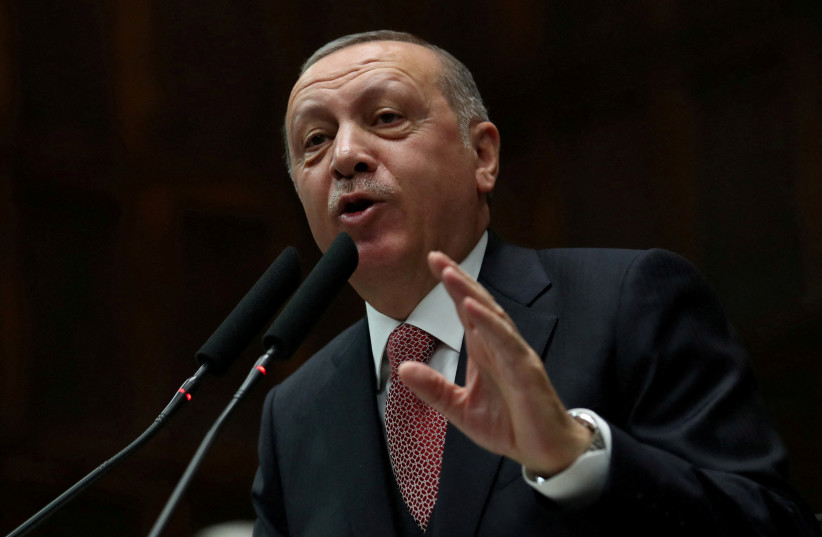Russia-Ukraine war: Turkey's dilemma as Moscow ally, NATO member - opinion

In all likelihood, Turkey’s appeal to Russia to halt the invasion will fall on deaf ears and demonstrate the limitations of Turkey’s foreign policy.
Turkey’s President Recep Tayyip Erdogan is a desperate man with his back to the wall. Since his AKP (Justice and Development Party) came to power in 2002, Turkey, which earlier was a solid pillar of the NATO alliance, changed direction.
In 2018 Erdogan’s head of international relations, Ayse Sozen Usluer, stated that Ankara had long preferred to diversify its foreign policy choices. “For the last 10 to 15 years in particular, Turkey has not felt the need to choose between the West and the East, or between the US and Russia. Turkey no longer sees its foreign policy within the framework of the Cold War or East vs West alliances.”
Now, after Russia’s invasion of Ukraine, Erdogan sits on the horns of a dilemma. On Friday, in connection with the NATO summit, he called for decisive action and not a mere routine reprimand. But what does Turkey, as Russia’s junior partner and a member of the Western alliance, actually intend to do?
For some time, Turkey – under Erdogan – has believed it’s been able to enjoy the best of both worlds. As late as a month ago, the president asserted EU membership was still a strategic priority, although the possibility has long been dismissed by the EU.
At the beginning of February, the Committee of Ministers of the Council of Europe officially launched infringement proceedings against Turkey for its refusal to release philanthropist Osman Kavala since his detention in October 2017. The European Court of Human Rights ruled for his release in December 2019, but this was ignored by Turkey. Erdogan has also declared that he considers the EU’s decisions in this respect “null and void.”
Furthermore, the European Parliament in its report on the implementation of the Common Security and Defense Policy (CSDP) voices regret over Turkey’s overall destabilizing role in many areas of concern in the EU and its neighborhoods, which threatens regional peace, security and stability.
Since 1974, Turkey has occupied northern Cyprus and in 1983 recognized the north as an independent state, as Russia has done with Donetsk and Luhansk. Now Turkey demands a two-state settlement in Cyprus instead of the agreed UN parameters of a bi-zonal and bi-communal federation.
It also makes a claim on Greece’s Aegean islands in keeping with its “Blue Homeland” doctrine and consequently has renamed the Aegean “Sea of Islands.” So far, it is only Greece’s defense agreements with the US and France that have made Turkey keep its distance.
In July 2020 there was a clash over the small Greek island of Kastellorizo off Turkey’s south coast, and it was only through Berlin’s intervention that war was averted.
Turkey’s AKP government has relied on the narrative of a booming economy for electoral success, but already in 2014 American economist Jesse Colombo warned of a bust, based as it was on cheap credit, consumption and construction. Now the chickens have come home to roost with the lira’s collapse and Erdogan’s unorthodox belief that galloping inflation can be combated by lowering the interest rate.
The president and the AKP now face defeat in next year’s presidential and parliamentary elections, and Erdogan is in urgent need of a rabbit he can pull out of the hat. Gone is the appeal of a foreign war, which he has used to whip up popular support with incursions in Syria, Libya, Iraq and Nagorno-Karabakh.
Instead, he has chosen to mend fences with the UAE in search of investment, and with Israel in the hope of a gas deal now that plans for the EastMed pipeline to Europe involving Israel, Cyprus and Greece have been shelved.
RUSSIA’S INVASION of Ukraine has placed Turkey in a dilemma, because until now Turkey has been able to run with the hare and hunt with the hounds. In 2021, Turkey was the largest foreign investor in Ukraine; it exported a dozen Bayraktar TB2 drones to Ukraine, and agreed with Ukraine on the co-production of this technology.
In 2016, Turkey joined the Syrian peace process together with Russia and Iran, but its presence in Syria is dependent on Russia’s goodwill. When Turkey shot down a Russian fighter jet in November 2015, a Russian embargo on Turkish tourism, the planned TurkStream gas pipeline and the construction of Turkey’s first nuclear power station elicited an apology from Erdogan.
Despite Turkey’s purchase of Russia’s S-400 missile defense system in defiance of the US, Russia has never truly considered Turkey as a strategic ally but only as a close partner. Indeed, Turkey’s condemnation of Russia’s invasion has only been met with a shrug.
In all likelihood, Turkey’s appeal to Russia to halt the invasion will fall on deaf ears and demonstrate the limitations of Turkey’s foreign policy.
The writer is an international adviser at RIEAS (Research Institute for European and American Studies) in Athens.
Jerusalem Post Store
`; document.getElementById("linkPremium").innerHTML = cont; var divWithLink = document.getElementById("premium-link"); if (divWithLink !== null && divWithLink !== 'undefined') { divWithLink.style.border = "solid 1px #cb0f3e"; divWithLink.style.textAlign = "center"; divWithLink.style.marginBottom = "15px"; divWithLink.style.marginTop = "15px"; divWithLink.style.width = "100%"; divWithLink.style.backgroundColor = "#122952"; divWithLink.style.color = "#ffffff"; divWithLink.style.lineHeight = "1.5"; } } (function (v, i) { });

